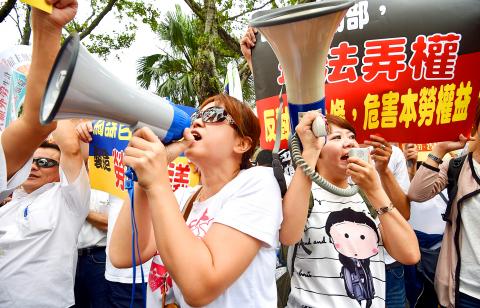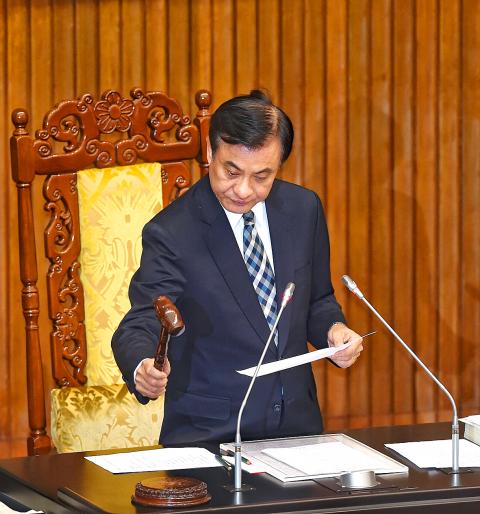Foreign blue-collar workers will no longer be required to leave the nation every three years, according to an amendment to the Employment Service Act (就業服務法) passed by the Legislative Yuan yesterday.
The amendment, sponsored by Democratic Progressive Party (DPP) Legislator Wu Yu-chin (吳玉琴), removed a clause from the act that required foreign blue-collar workers to exit the nation for a least one day following the expiration of their three-year work permits.
Two opposing protests — organized by labor agencies and labor rights groups — were held outside Legislative Yuan gates as the amendment was being considered, with labor agency representatives expressing concern over a lack of “complementary measures” to ease the effects of the amendment.

Photo: Peter Lo, Taipei Times
Foreign white-collar workers, who fall under separate regulations, are already exempt from exit requirements, which has drawn criticism for forcing blue-collar workers to repeatedly shoulder expensive labor agency fees, even when continuing to work for the same employer.
“Foreign workers have had to pay agency fees of between NT$70,000 and NT$180,000 every three years upon their return after leaving the country. That is permitting exploitation by foreign brokers,” Wu said yesterday.
Depending upon their profession, blue-collar foreign workers earn monthly salaries of between NT$17,000 and NT$20,008, according to government regulations.

Photo: Fang Pin-chao, Taipei Times
As of the end of July, 603,109 foreigners were employed as manual laborers, construction workers, factory workers or domestic helpers, Ministry of Labor data showed.
The ministry has estimated that about 14,000 foreign workers had to leave the nation annually because of the provisions, with individual workers subject to agency fees in their country of origin.
The amendment was also touted for allowing Taiwanese families relying on foreign caregivers to avoid “open window” periods when caregivers are forced to return to their home countries with their permits subject to renewal.
“This is a conspiracy by the Ministry of Labor,” Taoyuan City Employment Service Institute Association executive director Jack Huang (黃杲傑) said as protesters called for the resignation of Minister of Labor Kuo Fong-yu (郭芳煜).
He said it was unclear what kind of “direct hiring” system the ministry plans to implement, particularly whether foreign workers would still be required to pay domestic labor agencies monthly service fees after their employers renew their contracts.
Foreign workers rehired under “direct hiring” mechanisms are exempt from the fees, but most employers rely on agencies, he said.
“The direct hiring system implemented by the ministry was not sincere, because most employers cannot work their way through all the paperwork on their own,” he said.
“Now the government wants to take over the procedure through a direct hiring center, but does it have the resources to hire 30,000 people?” he said, citing an estimate of the number of people that labor agencies employ.
He said that the removal of the provision might allow “runaway” foreign workers to extend their stays, making it more difficult for agencies to manage their clients.
“The exit requirement provision is the only mechanism in place that allows us to sift through foreign workers. There is no government agency that has the ability to determine which workers are bad apples,” he said.
Meanwhile, members of the Taiwan International Workers’ Association (TIWA) said that the government should put “people before profits” and held mock human skins hanging from poles symbolizing their claim that agencies have used exit provisions to “skin” and exploit foreign workers.
“Migrant workers have no labor guarantees in areas such as overtime pay. If the agencies had done their job to resolve these issues, why are there so many foreign workers making appeals to the Ministry of Labor,” TIWA member Chuang Shu-ching (莊舒晴) said. “Agencies know that many families let foreign caregivers work beyond their permits, but what have the agencies done about it? All they do is brand anyone who appeals to the government a ‘bad apple’ who has to be sifted out by the exit provision system.”
Removing the mandatory exit clause would not affect employers’ ability to fire workers, because employers could still choose to refuse to renew their three-year contracts, TIWA member Chen Hsiu-lian (陳秀蓮) said.
Premier Lin Chuan (林全) lauded the passage of the amendment, saying: “The workers would benefit from the alleviated burden of debt” accrued from brokerage fees, and therefore the relationship between the employers and the workers would stabilize, as fewer disputes would occur over their their limited period of stay.
Lin said that supporting measures planned by the ministry include holidays, when migrant workers can visit their home nations, and not placing a financial burden on their employers.
“A win-win situation for employers and workers is an outcome we most welcome and hope for,” he said.

The CIA has a message for Chinese government officials worried about their place in Chinese President Xi Jinping’s (習近平) government: Come work with us. The agency released two Mandarin-language videos on social media on Thursday inviting disgruntled officials to contact the CIA. The recruitment videos posted on YouTube and X racked up more than 5 million views combined in their first day. The outreach comes as CIA Director John Ratcliffe has vowed to boost the agency’s use of intelligence from human sources and its focus on China, which has recently targeted US officials with its own espionage operations. The videos are “aimed at

STEADFAST FRIEND: The bills encourage increased Taiwan-US engagement and address China’s distortion of UN Resolution 2758 to isolate Taiwan internationally The Presidential Office yesterday thanked the US House of Representatives for unanimously passing two Taiwan-related bills highlighting its solid support for Taiwan’s democracy and global participation, and for deepening bilateral relations. One of the bills, the Taiwan Assurance Implementation Act, requires the US Department of State to periodically review its guidelines for engagement with Taiwan, and report to the US Congress on the guidelines and plans to lift self-imposed limitations on US-Taiwan engagement. The other bill is the Taiwan International Solidarity Act, which clarifies that UN Resolution 2758 does not address the issue of the representation of Taiwan or its people in

US Indo-Pacific Commander Admiral Samuel Paparo on Friday expressed concern over the rate at which China is diversifying its military exercises, the Financial Times (FT) reported on Saturday. “The rates of change on the depth and breadth of their exercises is the one non-linear effect that I’ve seen in the last year that wakes me up at night or keeps me up at night,” Paparo was quoted by FT as saying while attending the annual Sedona Forum at the McCain Institute in Arizona. Paparo also expressed concern over the speed with which China was expanding its military. While the US

SHIFT: Taiwan’s better-than-expected first-quarter GDP and signs of weakness in the US have driven global capital back to emerging markets, the central bank head said The central bank yesterday blamed market speculation for the steep rise in the local currency, and urged exporters and financial institutions to stay calm and stop panic sell-offs to avoid hurting their own profitability. The nation’s top monetary policymaker said that it would step in, if necessary, to maintain order and stability in the foreign exchange market. The remarks came as the NT dollar yesterday closed up NT$0.919 to NT$30.145 against the US dollar in Taipei trading, after rising as high as NT$29.59 in intraday trading. The local currency has surged 5.85 percent against the greenback over the past two sessions, central